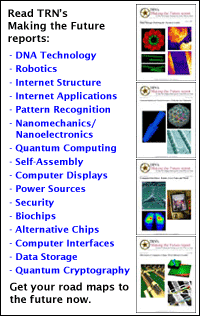
Hot
spots give away lying eyes
By
Kimberly Patch,
Technology Research NewsYou can't always see a person blush, but a computer that tracks heat changes can sense even subtle shifts in the amount of blood in the capillaries that lie just under the skin.
Researchers from the Mayo Clinic and Honeywell Laboratories have come up with a way to measure these heat changes in a person's face in order to tell whether the person is lying or telling the truth.
The system consists of a high-definition thermal imaging camera and a computer. The camera takes pictures of heat emanating from a subject's face, and the computer provides a quick analysis of any changes.
Monitoring blood changes in the face is similar to the traditional polygraph exam, according to James Levine, a consultant at the Mayo Clinic. The polygraph lie detector test measures changes in a subject's breathing, pulse rate and blood pressure. It also measures sweating by sensing changes in skin conductance via electronics attached to the skin.
The thermal method measures infrared lightwaves, or heat, around the person's face. The infrared light shows up on the computer screen as red areas. The theory behind using thermal changes in a person's face to detect lying is similar to the principal behind the polygraph. When someone is not telling the truth there is likely to be instantaneous warming around the eyes, which is probably a natural response produced by the sympathetic nervous system, said Levine.
The thermal method is as accurate as traditional polygraph tests, according to Levine. It is also faster than polygraph tests and doesn't require the subject to be connected to a device, he said.
The researchers tested their theory and the system at the U.S. Department of Defense Polygraph Institute. Twenty volunteers were randomly assembled into two groups. One group was instructed to stab a mannequin, take $20 from it, then lie about what took place.
The thermal imaging system correctly identified six of eight of the subjects who were lying, and 11 of 12 who were innocent. The subjects were also put through traditional polygraph tests, which correctly identified the same number of guilty subjects, but correctly identified only eight of the 12 innocent subjects.
Thermal imaging operators would not need the type of training to carry out the tests that traditional polygraph tests require, according to Levine.
"The technique sounds interesting and promising," said Christoph Koch, a professor of cognitive and behavioral biology at the California Institute of Technology. "For mass security and screening applications, you need a technology that can rapidly, at low-cost and with a low false alarm rate, screen people."
The accuracy of polygraph methods is controversial, said Koch. However, if the thermal imaging technique is faster than polygraphs and if it is less prone to label truthful statements lies it is worth investigating further, he said.
The researchers are continuing to test the method and are aiming to turn it into a practical security application, said Levine.
Levine's research colleagues were Ioannis Pavlidis From Honeywell Laboratories and Norman L. Everhardt from the Mayo Clinic. They published the research in the January 3, 2002 issue of Nature.
Timeline: 2-4 years
Funding:
TRN Categories: Computer Vision and Image Processing; Applied Computing
Story Type: News
Related Elements: Technical paper, "Seeing through the Face of Deception," Nature, January 3, 2002.
Advertisements:
January 23, 2002
Page One
Laser speeds data through air
Nanotube array could form chips
Hot spots give away lying eyes
Quantum data compares faster
Artificial crystals change laser colors
News:
Research News Roundup
Research Watch blog
Features:
View from the High Ground Q&A
How It Works
RSS Feeds:
News
Ad links:
Buy an ad link
| Advertisements:
|
 |
Ad links: Clear History
Buy an ad link
|
TRN
Newswire and Headline Feeds for Web sites
|
© Copyright Technology Research News, LLC 2000-2006. All rights reserved.